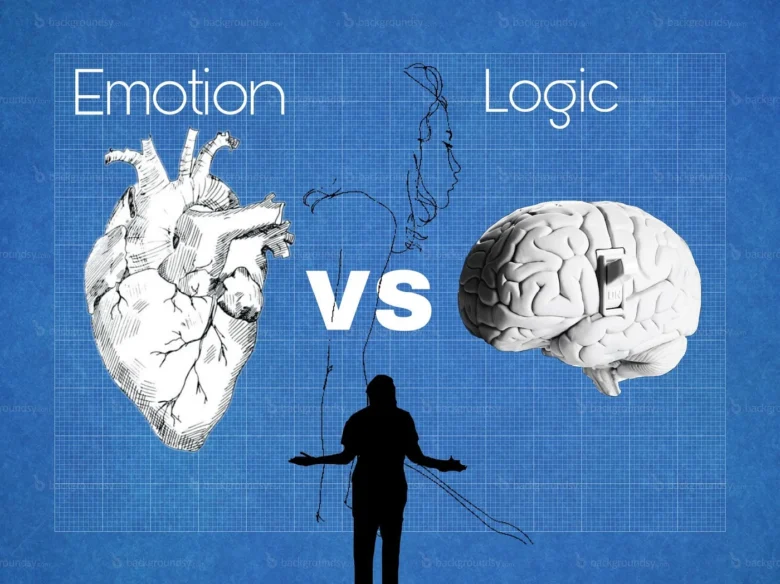Every trader enters the market to make money. Even if you study the market and keep a close eye on the charts, you can still lose money on your trades. Why? Most of the time, it comes down to a battle between emotion and logic, with logic being more technical and personal. The market is a battlefield, and your mind takes the lead. But letting your emotions dictate your strategy is like a war without a plan. This article explains how trading based on emotions can cause you to lose money, why it happens even to experienced traders, and how to prevent emotions from ruining your trades. Stay tuned to learn more about the hidden forces that can cause you to lose money and how to take full control of the situation.
How to Understand the Meaning of Emotions in Trading:
We all have emotions, but when it comes to selling, emotions can be the worst. It is normal to feel fear when the market is falling rapidly. When the market is rising, people can become greedy. When you feel these emotions, you make rash decisions that cause you to buy or sell too high or too low. Fear often causes you to exit before the market rises again. You stay in a trade too long because you are eager for more profit, just before the market is about to fall. You continue to lose money because your emotions prevent you from making smart decisions. It’s not that your plan is bad; it’s your emotions that are holding you back. Emotion-driven trading is reactive, not strategic. It ignores your long-term plans; instead, it reacts to short-term noise, making it difficult to be consistent or logical.
Why Logical Thinking Isn’t Enough:
Every business should be based on logic. You look at charts, look at historical data, set stop-loss levels, and stick to your plan. That said, reasoning loses its meaning when your money is on the line. The brain is often unable to make smart decisions under high pressure. Cognitive biases start to manifest themselves during trading. For example, confirmation bias can cause you to ignore danger signals, while loss aversion can cause you to continue making losing trades. Your brain starts making excuses for a wrong choice, just to escape the emotional pain of a mistake. Your feelings scream, “Maybe this will work out,” even when your mind is telling you to “get out of here.” That’s the trap: feelings feed doubts and push thinking aside. This tension in your mind makes it harder to make decisions and leads to erratic trading results.
The Psychology Behind Emotion-Based Trading:
Trading based on feelings has deep psychological roots. People trade because they are afraid of losing, want to win, and feel like they are right. Markets are unpredictable and make people anxious. Most buyers don’t realize how emotionally draining it is to see money changing hands every minute. Your “fight or flight” response is triggered by this stress, making it hard to think clearly and causing you to act without thinking. When you win, you can become overconfident because of the energy you gain. On the other hand, repeated losses can trigger a fear cycle that makes you hesitate or even abandon your trading system altogether. To become a better investor, you must first realize that controlling your emotions is more important than learning to read charts. Your emotions can either help you the most or hurt you the most.
How to Identify Emotional Triggers in Your Trades:
You have to figure out what the problem is before you can fix it. Many investors don’t even realize that they are trading based on emotions. What do they think is causing the emotion? Is it the market, bad luck, or their system? However, there are some telltale signs, such as entering a trade because of fear of missing out (FOMO), exiting a trade quickly because of worry, doubling your stake to “cover” losses, or ignoring stop orders because you “feel” the market is going to turn. These choices are not based on strategy but on gut feeling. You can track these patterns by recording them in a trading notebook. Remember how you feel when you are investing, and write them down. Over time, your feelings will become clearer. Figuring out what makes you feel that way is like shining a light on your enemy; it puts you in control of it, instead of it controlling you.
Use Your Feelings to Your Advantage:
You can’t get rid of your feelings, but you can control them. The key is not to become a robot, but to focus on your feelings and maintain self-discipline and consistency. Set clear rules before you start trading and always follow them. Stop-loss and stop-loss levels are practical tools that can help you make automatic decisions without being influenced by emotions. Take a break now and then to clear your head. Mindfulness and breathing exercises can help you reduce anxiety. When your feelings arise, accept them, but don’t let them control your behavior. This mental exercise will become a habit over time. At some point, you will start using logic as a guide and feelings as a signal to stop and reconsider. From that moment on, you are no longer a gambler but a real trader.
Conclusion:
The hard truth is that most trading failures are not due to bad strategies but to emotional choices. Your account balance will tell you who the winner is in the battle between emotion and reason. If you let fear, greed, and anger control your trading, you will move further and further away from success. But you are not powerless. To break the self-destructive cycle, you need to be more aware of your emotional habits and make decisions that are more logical. Trading is always risky, but when you learn to think, you can take back control. You don’t just want to make money; you want to be a disciplined, stable, and confident trader who trades with intelligence instead of emotion. Your breakthrough doesn’t start with the next chart position; it starts with your mindset.
FAQs:
1. Why do my emotions have such a big impact on my trading?
Traders feel deep emotions like fear, greed, and anxiety because they are dealing with real money and real danger. These emotions can get in the way of reason, especially when the situation is tense.
2. Is it possible to trade without emotions?
You shouldn’t try to do this, and you shouldn’t do it. The goal of trading is not to hide your emotions but to control them. Be sensitive to your feelings, but follow your trading plan and rules when making decisions.
3. How can I quickly tell if I’m trading based on my feelings?
If you make impulsive choices, break your rules, or trade out of fear or greed instead of analysis, you may be trading emotionally.
4. How can you trade more rationally?
Follow a trading plan that has worked in the past, use automated tools like stop-losses, keep track of your trades in a ledger, and practice mindfulness to avoid making snap decisions.
5. What emotion can most ruin a trade?
Fear is often the worst emotion, as it causes traders to sell too early, miss opportunities, or chase losses. To trade consistently, you need to learn to deal with fear.



